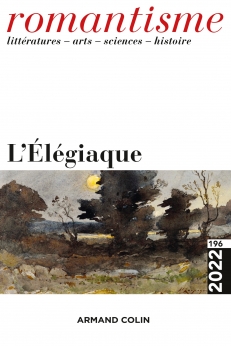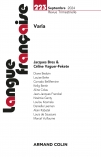
ROMANTISME N°196 (2/2022)
Pour acheter ce numéro, contactez-nous
Recevez les numéros de l'année en cours et accédez à l'intégralité des articles en ligne.
Explorant une période antérieure à celle qu’a étudiée DolfOElher dans Le Spleen contre l’oubli, cet article fait l’hypothèse d’une complicité étroite entre l’écriture de l’histoire et l’élégiaque dès les années 1820. Il s’appuie sur l’idée d’une « mélancolie de gauche » développée par Enzo Traverso dans un livre de 2016 qui porte ce titre. Se fondant sur des textes d’Augustin Thierry, de Jules Michelet et d’Edgar Quinet, la réflexion analyse la place faite à l’écoute de la plainte par l’histoire romantique, puis la perspective critique portée par cette écriture élégiaque. Elle envisage enfin l’hybridation de la poésie et de l’histoire, montrant que le registre élégiaque contribue à faire de l’histoire romantique une histoire poétique.
This paper, in exploring a period anterior to that studied by DolfOElher in Le Spleen contre l’oubli (Spleen enlisted against forgetting), hypothesises a close complicity between elegy and the writing of history as early as in the 1820s. It bases itself on the idea of a “left-wing melancholia” as developed by Enzo Traverso in a 2016 book of that title. Reading a number of texts by Augustin Thierry, Jules Michelet and Edgar Quint, it analyses the role in history as written by the Romantics of listening to the expression of lament, and then that of the critical perspective suggested by this elegiac writing. Finally, it considers the hybridation of poetry and history, showing that the elegiac register contributes to transforming Romantic history into a poetic history.

